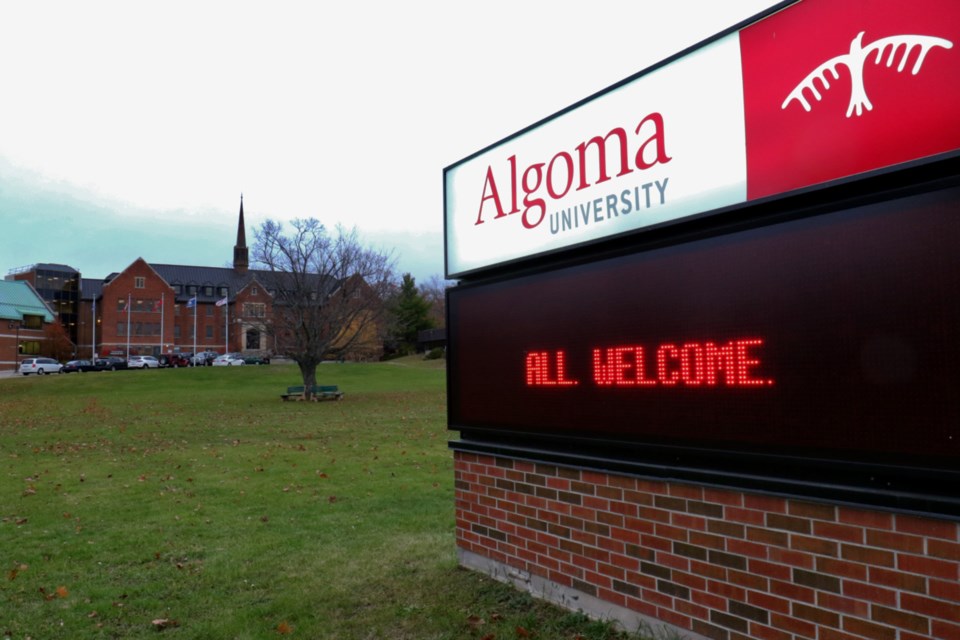Newly introduced Ontario government legislation will, if passed, make academic life easier for Algoma University.
Sault MPP and Minister of Colleges and Universities Ross Romano, joined Prabmeet Sarkaria, Associate Minister of Small Business and Red Tape Reduction, at the Ontario College of Art & Design (OCAD) University in Toronto Oct. 30 to announce the bill, known as the Better for People, Smarter for Business Act (Bill 132).
The bill proposes to simplify how colleges, private and out-of-province institutions receive consent to offer new degrees in Ontario and how publicly assisted institutions receive program funding approvals.
Bill 132 stems, in part, from a Private Member’s Bill, known as the Algoma University Amendment Act (Bill 79), first introduced by Romano in the Legislature March 6.
That bill was exclusively designed for Algoma University to grant further degrees and expand its degree-granting authority, something which has not happened since the university first gained its independence from Laurentian University in 2008.
“What we announced last week was the bill I put forward and combined the same thing Algoma and OCAD in Toronto was looking for,” Romano said, speaking to SooToday Monday.
“That (Bill 132), I would expect, within a matter of weeks, will be before the Legislature for its final vote. I’m confident it will be passed and receive assent and I would anticipate that we’re moving toward Algoma University as well as OCAD University having their full degree-granting authority in the not too distant future.”
“Algoma would not need to come back to the Ministry for permission for each and every program, Master’s programs, anything of that nature, they would not need to get approval. They would be able to do so within their own power, they would only have to go through their own internal processes (such as obtaining Algoma University Board of Governors approval),” Romano said.
If passed, the legislation would drastically shorten the wait time involved for Algoma and all other Ontario postsecondary institutions to get ministerial approval for new programs they propose.
Romano said he learned, after meeting with the heads of all Ontario universities and colleges, the wait time for approval for programs would sometimes be two to three years in length.
“I thought as a government we needed to do so much better, that it was unfair for us to look at universities and colleges and expect them to better meet the needs of the labour market and for it to take two to three years to approve, I thought that was nowhere near good enough.”
As a result, Romano said, “I’ve made some changes in our Ministry and we’ve now reduced the program approval process to a maximum of six months.”
“I think it’s a massive win for Algoma University, the city of Sault Ste. Marie and the entire district of Algoma to have a university with full degree-granting authority. I think it allows our local university to be more responsive to the needs of the labour market in our community, to grant degrees in areas where the greatest market demand lies,” Romano said.
“The legislation, once passed, will be beneficial to Algoma University in several ways. First, the expanded authority to grant degrees in any discipline will allow us to be more responsive to local, regional and national labour market needs, and we'll be able to respond to student interest and demand, as well as to faculty interest in program expansion. When Algoma University became independent from Laurentian University in 2008, we originally could grant degrees only in subjects we had delivered for Laurentian,” wrote Donna Rogers, Algoma’s academic dean, in an email to SooToday.
“We've developed new academic programs since then that have eventually received Ministry approval, but the process is cumbersome and expensive...examples of new programs approved since 2008 include Biology, Environmental Science, Social Work, Anishinaabe Studies. Each of these took approximately two years to move through the existing approval process, which does not let us move quickly to respond to student, community and societal demand.”
“We have plans to propose several new programs in the near future, and a more efficient approval process will allow us to offer them sooner,” Rogers wrote.
“We want to create a few select Master's programs, for example, in areas such as biology, business or management, health sciences and computer science. The legislation aims to enable us to offer such degree programs, with a robust but efficient approval process,” Rogers wrote, adding the new legislation would also readily meet the unique needs of Algoma’s Brampton and Timmins campuses.
